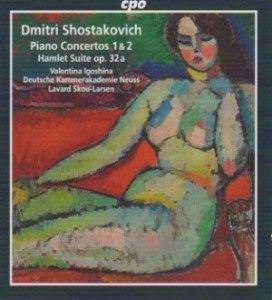There are many excellent recordings of these works, some of them truly dazzling. Valentina Igoshina doesn’t out-blaze Denis Matsuev and the St. Petersburg Philharmonic in the First concerto (RCA), but he’s much less impressive in the Second than Igoshina, and the Deutsche Kammerakademie Neuss under Lavard Skou-Larsen plays with all of the necessary precision and fire (Thomas Hammes is the excellent trumpet soloist in the First concerto). Similarly, no one will likely match Hamelin for sheer digital bravura, but as Igoshina demonstrates, there are many approaches to this music and her way proves to be perfectly valid and in no way less powerful or captivating.
In the earlier work tempos are aptly manic when the music goes crazy in the madcap episodes of the first movement or the finale, but what’s most impressive is the fact that Igoshina and Skou-Larsen leave sufficient room for the insanity to come. You never have the feeling, as in so many other performances, that the music has run out of gas just as it wants to take off. She shapes and phrases the solo parts of both works with unfailing point and intelligence. Consider, for example, the opening melody of the Second concerto, or the way that she treats the lovely romantic melody of the same work’s slow movement. Her subtle handling of accents and dynamics consistently sustains interest over the longest musical paragraphs, and the result is completely convincing. For consistency of results over both concertos on a single disc, these interpretations are as good as any in the catalog.
What makes this release more attractive is a coupling that really adds to its value. Shostakovich’s incidental music to Hamlet is a rarity on disc. It’s an early work, from the same period as the First concerto, written in a similar style. Here’s an interesting bit of musicological trivia for fans of the composer. In the second movement, or “Reel”, of his film music for the silent movie New Babylon, he wrote a “can-can” that actually quotes Offenbach’s famous tune from Orpheus in the Underworld. This music was later used as the basis for the “can-can” in the ballet The Golden Age, but Shostakovich replaced the quotation with his own original tune. He then disassembled that number and turned it into three separate pieces in this suite of incidental music: if you listen to the excerpt below and think “Offenbach” while listening to Shostakovich’s theme you’ll get the idea—at least if you don’t feel like investigating all of the original source material. In any case, the performances are great, and so is the sound.
































